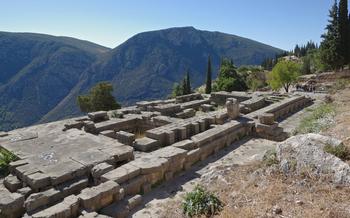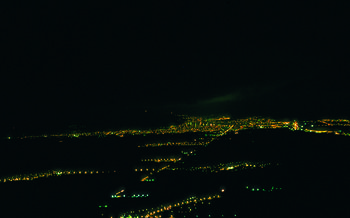
The Village of Vrisa Natural History Collection
- The Village of Vrisa Natural History Collection
- History of the Collection
- The Collection Today
- Educational Programs
- Exhibits
- Research
- Hours of Operation
- Admission Fees
- Getting There
- Accessibility
- Food and Drink
- Souvenirs
- Photography and Videography
- Insider Tip
The Village of Vrisa Natural History Collection
The Vrisa Natural History Collection is a unique and fascinating museum located in the village of Vrisa, on the beautiful island of Lesvos in Greece. Founded in 1985 by a passionate group of local naturalists and conservationists, the collection showcases the rich and diverse natural heritage of Lesvos and the surrounding region. With over 3,000 specimens of plants, animals, and fossils, the collection offers a glimpse into the island's incredible biodiversity and its role in the Mediterranean ecosystem.
The collection is housed in a traditional stone building that has been carefully restored to maintain its original character. Inside, visitors will find a series of well-organized exhibits that highlight the island's geology, flora, and fauna. The exhibits are interactive and informative, making them suitable for visitors of all ages and interests.
History of the Collection
The Vrisa Natural History Collection was founded in 1985 by a group of local naturalists and enthusiasts. Their goal was to establish a museum dedicated to the natural history of Lesvos. The collection began with a small number of specimens donated by local residents, but it has since grown to include over 10,000 specimens from all over the island.
The collection is housed in a purpose-built museum that was completed in 199The museum is located in the village of Vrisa, which is situated in the center of Lesvos. The museum is open to the public year-round and offers guided tours in several languages.
The Vrisa Natural History Collection has been a valuable resource for researchers and educators for over 30 years. The collection has been used to conduct a variety of research projects, including studies on the island's geology, flora, and fauna. The collection has also been used to develop educational programs for school children of all ages.
The Collection Today
The Vrisa Natural History Collection houses a diverse array of specimens, including fossils, minerals, rocks, plants, and animals. The collection is particularly strong in its representation of the natural history of Lesvos, with a special focus on the island's unique geology and biodiversity.
In addition to its permanent collection, the Vrisa Natural History Collection also hosts a variety of temporary exhibits. These exhibits often feature the work of local artists and scientists, and explore a wide range of topics related to natural history.
Some of the highlights of the collection include:
- A large collection of fossils from Lesvos, including dinosaur bones, marine fossils, and plant fossils.
- A collection of minerals and rocks from Lesvos, including rare and beautiful specimens.
- A collection of plants and animals from Lesvos, including many endemic species.
- A collection of insects from Lesvos, including a large number of butterflies and moths.
- A collection of birds from Lesvos, including many migratory species.
Educational Programs
The Vrisa Natural History Collection offers a variety of educational programs for all ages. These programs are designed to help visitors learn about the natural history of the region and the importance of conservation.
The collection's educational programs are led by experienced naturalists who are passionate about sharing their knowledge. Programs are available for groups of all sizes, from school groups to corporate groups.
Some of the programs offered by the collection include:
- Guided tours of the collection
- Nature walks
- Birdwatching workshops
- Geology workshops
- Conservation workshops
The collection also offers a variety of resources for teachers, including lesson plans, activity sheets, and multimedia presentations.
To learn more about the collection's educational programs, please visit the collection's website or contact the education department.
Exhibits
The Vrisa Natural History Collection offers a variety of exhibits that showcase the diversity of the natural world. The exhibits are designed to be informative and engaging, and they are suitable for visitors of all ages.
Some of the current exhibits include:
-
The Birds of Greece: This exhibit features a collection of birds that are native to Greece. The birds are displayed in their natural habitats, and visitors can learn about their behavior, diet, and migration patterns.
-
The Mammals of Greece: This exhibit features a collection of mammals that are native to Greece. The mammals are displayed in their natural habitats, and visitors can learn about their behavior, diet, and conservation status.
-
The Reptiles and Amphibians of Greece: This exhibit features a collection of reptiles and amphibians that are native to Greece. The reptiles and amphibians are displayed in their natural habitats, and visitors can learn about their behavior, diet, and conservation status.
-
The Insects of Greece: This exhibit features a collection of insects that are native to Greece. The insects are displayed in their natural habitats, and visitors can learn about their behavior, diet, and conservation status.
-
The Fossils of Greece: This exhibit features a collection of fossils that have been found in Greece. The fossils include bones, teeth, and footprints of animals and plants that lived millions of years ago.
The exhibits at the Vrisa Natural History Collection are constantly changing, so there is always something new to see. Visitors can check the collection's website or call ahead to find out what exhibits are currently on display.
Research
The Vrisa Natural History Collection is actively involved in a variety of research projects. These projects focus on a wide range of topics, including the biodiversity of the Aegean region, the evolution of island ecosystems, and the impact of climate change on natural history. The collection's research staff is composed of a team of experienced scientists who are dedicated to advancing our understanding of the natural world.
The collection's research findings are published in a variety of scientific journals and presented at conferences around the world. The collection also collaborates with other research institutions and universities to conduct joint research projects.
If you are interested in learning more about the collection's research, you can visit the collection's website or contact the collection's research staff directly. The collection's staff is always happy to answer questions and provide more information about their research projects.
Hours of Operation
The Vrisa Natural History Collection is open to the public from Tuesday to Sunday, from 9:00 AM to 5:00 PM. The collection is closed on Mondays. Special hours may be available for groups or individuals by appointment. To find out about changes to the hours of operation, please visit the collection's website or call ahead.
Admission Fees
- Is there an admission fee to visit the collection?
Yes, there is a small admission fee to visit the Vrisa Natural History Collection. The fee helps to support the collection's educational programs and exhibits.
- How much is the admission fee?
The admission fee is 5 euros for adults, 3 euros for children and students, and free for children under 3 years old.
- Are there any discounts for groups or individuals?
Yes, there are discounts for groups of 10 or more people. The discount is 1 euro per person.
- How can you pay the admission fee?
You can pay the admission fee in cash or by credit card.
Getting There
The Vrisa Natural History Collection is located in the village of Vrisa, on the island of Lesvos, Greece. The village is situated about 35 kilometers southwest of the island's capital, Mytilene. To get to the collection, you can take a bus or taxi from Mytilene. The bus ride takes about an hour, and the taxi ride takes about 45 minutes. If you are driving your own car, you can follow the signs from Mytilene to Vrisa. The collection is located on the main road through the village.
There is limited street parking available in the village of Vrisa, so it is recommended to arrive early or park in the designated parking lot, which is a short walk from the collection. The collection is also within walking distance of several other attractions in the village, such as the Vrisa Folklore Museum and the Vrisa Olive Oil Museum.
Accessibility
The Vrisa Natural History Collection is accessible to people with disabilities. The entrance to the museum is wheelchair accessible, and there are ramps and elevators throughout the building. There are also accessible restrooms and water fountains.
Wheelchairs are available for rent at the museum's front desk. The staff is happy to assist visitors with disabilities and answer any questions they may have.
To find out more about accessibility at the Vrisa Natural History Collection, please contact the museum's front desk at 22510-4348
The museum also offers special programs and events for people with disabilities. These programs and events are designed to provide opportunities for people with disabilities to learn about and enjoy the museum's collection. For more information about these programs and events, please contact the museum's education department at 22510-4348
Food and Drink
There are few food and drink options available at the Vrisa Natural History Collection. There is a small café that serves coffee, tea, and pastries. There are also a few vending machines that sell snacks and drinks. Outside the collection, there are a number of restaurants and tavernas that serve traditional Greek cuisine. You can find everything from simple souvlaki to fresh seafood and local delicacies. If you are on a budget, you can bring your own food and drinks. There are several picnic areas located on the grounds of the collection.
Souvenirs
The Vrisa Natural History Collection offers a variety of souvenirs for purchase, including books, postcards, and T-shirts. The books cover a wide range of topics related to natural history, including the geology, flora, and fauna of Lesvos. The postcards feature beautiful photographs of the collection's specimens and exhibits. The T-shirts are made from organic cotton and feature the logo of the collection.
The souvenirs are available for purchase at the collection's gift shop. The gift shop is open during the same hours as the collection. Prices for souvenirs range from €00 to €20.00.
Proceeds from the sale of souvenirs help to support the collection's educational programs and research.
Photography and Videography
The Vrisa Natural History Collection welcomes visitors to take photographs and videos for personal use. However, there are a few restrictions in place to protect the collection and the privacy of other visitors.
Flash photography is not allowed, as it can damage the specimens. Tripods are also not allowed, as they can obstruct the flow of traffic and interfere with other visitors.
If you would like to take photographs or videos for commercial purposes, you will need to obtain permission from the collection staff in advance. You can do this by contacting the collection directly or by filling out a photography permit request form on the collection's website.
For more information about the photography and videography policy, please visit the collection's website or contact the collection staff directly.
Insider Tip
My top tip for visitors to the Vrisa Natural History Collection is to take your time and explore all the exhibits. The collection is home to a vast array of specimens, from fossils to minerals to live animals. There is something for everyone to enjoy, and you can easily spend several hours wandering through the exhibits. Be sure to check out the collection's website before your visit to learn more about the current exhibits and events.


